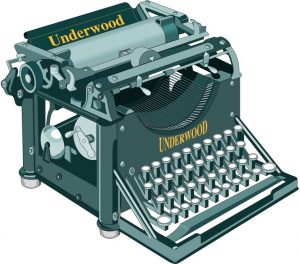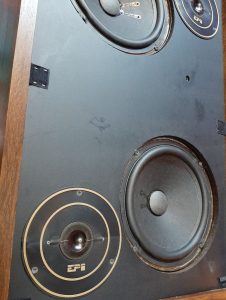
If you're a serious audiophile, one of the things you can be certain of is that you're eventually going to have a problem. If you're lucky, it might just be that something in your system breaks or, like tubes and some other kinds of electrical or mechanical parts, eventually wears out. If you're less lucky, the problem can be worse: Although nothing seems wrong, something no longer seems right.
Do you remember how, when you first set up your system, it seemed so right in every way? Just about everything about it seemed perfect, and the "Thing A" (take your pick as to what that might be: tonal balance, frequency range, harmonic structure, dynamics, transient attack and decay, imaging and soundstaging, or any of the other things that go to make up a realistic and believable musical performance) was so good that you found yourself grinning every time you heard it.
Then, over the course of time, ("little by little, a little later" as Ken Nordine used to say) the "What have you done for me lately" syndrome sets in and, instead of noticing what was so terrific about your system, you eventually get to where you notice only its flaws. This doesn't, of course, occur immediately or even, necessarily, within just a short period of time. Eventually, though, "the audiophile problem" does set in, and what was initially just a small and occasional "not quite right" rendering of some aspect of the music (call it "Thing L") starts calling attention to itself over and over again, always demanding more of your notice until, finally, it dominates your listening and you know that something needs to be done.
So, what should you do?
Well, if you're like many of us, who watch the ads, read the reviews, talk HiFi with our audiophile friends, and are thus regularly bombarded with "news" about how much better the new stuff or the next-level-up stuff is than what we've already got, you might very well find yourself tempted to buy some new gear to solve the problem and make your system great again.
And that, if it's not really necessary, can be a problem in itself.
If something really is broken or worn-out in your system, certainly it ought to be fixed or replaced. But what if it's just that you've gotten used to all of your system's good points and, now taking them for granted, you're noticing only the shortcomings that "stick out" and annoy you? What if your system is still just exactly as good as it was when you first enthused over it, and it's you or your perception of it that has changed?
It is certainly possible that elements of your system have degraded over time, with connections oxidizing or getting dirty and needing to be cleaned and re-connected, capacitors or other circuit components aging, and tubes regularly needing to be re-biased, or replaced. It's also possible that, over time, as you've gained more knowledge and experience, your tastes and preferences have changed, and what seemed great to you before is now simply no longer up to your standards.
Because of that, the very first thing you should do is to find out what's really happening, and to accomplish that, the very first thing you should do is a simple system tune-up.
That's easier than you might expect. All you have to do is to:
- Unplug everything that feeds or is part of your system, leaving nothing plugged into any wall and no two components still connected.
- Clean every contact, including tube sockets, using either 99% isopropyl alcohol, (regular isopropyl "Rubbing Alcohol" isn't as strong a cleaner and leaves a residue behind), or use Caig Labs' De-Oxit, or some other good contact cleaner/treatment.
- After cleaning, re-assemble everything, making sure that all system grounds are either connected or not, depending on which gives the lowest level of hum and noise. (Try it both ways to find out.)
- Take a screwdriver to everything, making sure that all chassis screws and equipment rack bolts are tight, and that all of the screws on both (all) of your speakers, including the ones holding the drivers in place, are tight, but not overtightened. If you have spike feet on anything (speakers, turntable, other components), make sure that they are fully tightened, or replace them with AV RoomService EVPs.
Once you've done that, and you know that your system is performing as well as it can, listen to it, using at least two recordings. First, listen to one that you know is of "demo" quality, but that's either new to you or that you haven't heard for such a long time that it's effectively new to you. (This is sort of like the small dish of sherbet gourmets use to "clean" their palate before sampling a new taste.) Then, after listening to that one at least twice, listen to another recording—one that you are thoroughly familiar with and have always been both pleased and impressed by.
When you listen to the first recording the first time, listen as if you were auditioning new equipment—without bias, and with your ears open to whatever it might have to offer. The object here is to get a new impression of your system, without whatever preconceptions you might have developed over time.
With a new or at least unremembered recording (new is obviously to be preferred), you can do that because you won't, (especially after the tune-up), know whether what you're hearing—either good or bad—is because of the recording or because of your system. As you listen that first time, remember what about the sound you like and what you don't. Write it down if you need to. Then listen again, making it a point to listen for both what you originally most liked about your system (Thing A) and what you've become disappointed with over time (Thing L).
Only then, after you've gotten a new impression of what your system really sounds like with that first, "unknown" recording, should you put on and listen to the other recording.
When you do it, is the Thing A still as good as you remembered? Is the Thing L still a problem? Are there other things that you're now noticing for the first? Do you like what you hear?
If there really were system problems, and they were just due to the need for ordinary maintenance, those few simple steps of the tune-up might have been sufficient to solve them and bring your system back up to snuff. If so, wonderful—problem solved; go back and enjoy your system! And, even if not, you'll still have the benefit of whatever they did accomplish and the certain knowledge that you're getting closer to discovering what the real issue might be.
If the problem is that your own growth has gotten beyond the ability of your system to satisfy, good for you, too; your better understanding of your needs will help you to build a better system.
Either way, you win!





































